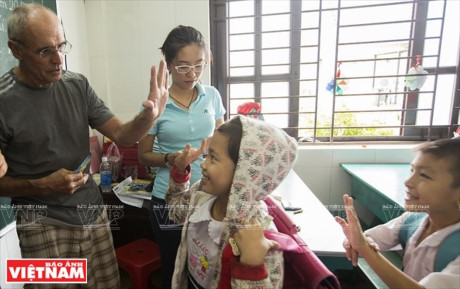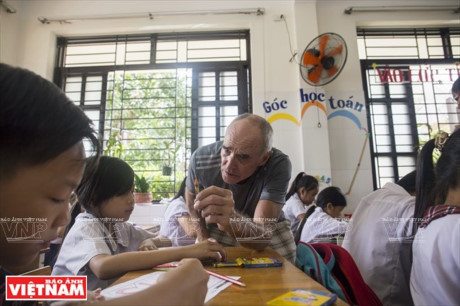In the past three years, Rich, a 66-year-old American man, spends nearly one hour every day riding to his workplace, Binh An Center for Development in District 8, HCM City, where he works as an English teacher for disadvantaged kids.

Rich, whose full name is Richard Joseph Hoesch, comes from Seattle and Washington DC, USA.
He traveled to Vietnam in 2014 after retiring, and since then, he has been dedicating to training children, especially the underprivileged in Binh An Center for Development.
Binh An Center, an affiliated of the non-governmental organization Friends of Street Children (FSC), is providing shelter to hundreds of needy kids in the city.
Many of the kids there are Rich’s students, who are always eager to study.
In their eyes, teacher Rich is someone who is always young at heart.
Teaching kids is challenging, since their level of concentration is unstable.
For a foreign trainer like Rich, language barriers make the job tougher.
Nonetheless, the loving teacher still manages to overcome all of the obstacles to convey knowledge to his students in the most effective way. He always tries his utmost to help the kids memorize English words, grammar structure and be confident with their communication.
Normally, Rich does not require students to do many exercises in workbooks, and instead, he focuses on engaging them in more interesting activities, including working in pairs or groups to apply newly learnt words and structure in real-life situations.
Rich’s exciting teaching method has stimulated the kids’ eagerness to study.In every lesson, the students cannot wait for their turn to come up to the blackboard to describe a new word through their drawing, from a teddy bear to a ball or a train.
At the same time, as a native speaker, Rich particularly pays attention to his students’ pronunciation. In case any of them makes a mistake, he will try to use a simple Vietnamese phrase, such as “noi lai” (say it again), or “khong, khong” (no, no) to correct them.
To a foreigner who does not speak host country’s mother tongue very well, body language is considered the fastest way to get thing done.
For instance, to illustrate the word “airplane”, Rich will spread his two arms like the two wings of the object, while shaking his back as if he is flying.
It takes Rich a lot of energy to depict the “airplane” in that way. But the method workssince none of the kids get bored, as they keep laughing out loud at the teacher’s funny expressions.
After dedicating efforts in teaching 2nd, 3rd students, Rich continues his training for adult learners, particularly the teacher at Binh An center.
“Everyone here loves learning English, therefore we are very patient to wait for Rich to finish his previous class for our turn to study. Although we are not quick learners, little by little, we are getting used to simple phrases and sentences for basic conversation, such as greetings, talking about hobbies, daily routines, among others. Now, when we have foreign guests visiting us, we are able to apply what we have learnt into practice,” said Hanh, one of the nuns working in the center.
Vietnam does not let me down

Rich still enjoys traveling by bike, his favorite and most frequently used means of transport.
“Unlike most Vietnamese here, I adore the sun. To me, riding under the sun is a privilege, because in my homeland, for nine months of the year, the weather is cold and gloomy,” he explained.
“I love the feeling of riding my bike along Hoang Sa Street, where I can see Vietnamese of different ages going out for morning exercises, having a walk with their children, their pets, or praying in front of a temple. That scene brings peace to my mind. The people I meet on my way are very amicable. For example, if they can speak some English, they won’t feel shy to approach me with a friendly “hello”, Rich said.
He said that living abroad was his dream when he was young. However, he could not do it until retirement.
Rich initially decided to travel to Brazil, but later changed his mind after talking to some friends who recommended Vietnam, which has become part of his life.
However, Rich also admits that adapting to the new living environment was very challenging.
He has toget used to a lot of strange things, including congested streetsand the ‘free-style’ driving of the locals.
“If you’re not mindful, you are very likely to be hit by a motorbike travelling in a wrong direction. I have to train myself to ride like a Saigonese. When I was in the US, it was easy. When the green light is on, we just cross the road without thinking of anything, but here, I have to forget that habit, and pay attention to the movement of other vehicles, instead.”
Earlier, some of Rich’s American friends were concerned about his decision to live in Vietnam, the land that was devastated by the US in the past.
“I told them that Vietnam is the country in which 60 per cent of the population are young people. At the same time, the war ended four decades ago. The people seldom mention the war, and this is what happens in the US nowadays. I am impressed by both Vietnam’s pursuit of change and its attempt to preserve traditional values. I have met many Vietnamese people who value their family’s tradition over a high-paying job, high standard of living. I think it is not easy to balance those desires,” Rich said.
Explaining his willingness to teach English for the underprivileged kids, Rich said: “I notice that the people here show a lot of admiration to those who can speak English fluently, which makes me realize how lucky I am while I had a chance to learn a lot.”
“Teaching is a meaningful job, I think if possible, we should join hands to help enrich the disadvantaged kids’ knowledge, so they can keep pace with the rapid change of society, and become the active forces who can generate values for society in the future.”
VNF/VNN